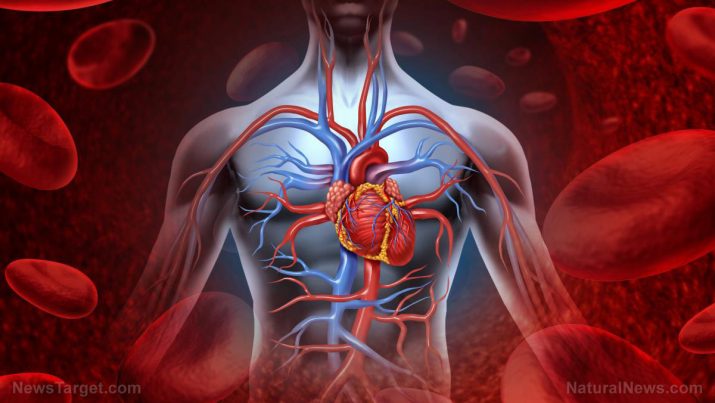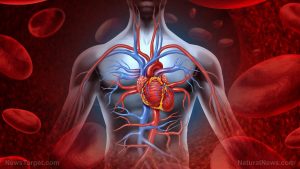
Restrictive cardiomyopathy – causes, side effects and treatments at NaturalPedia.com
Thursday, June 28, 2018 by Michelle Simmons
http://www.naturalpedia.com/restrictive-cardiomyopathy-causes-side-effects-and-treatments-at-naturalpedia-com.html

Restrictive cardiomyopathy is a heart muscle condition in which the ventricles of the heart become stiff because abnormal tissue, such as scar tissue, replaces the normal heart muscle. As a result, the ventricles cannot relax normally and fill with blood, while the atria become enlarged. The changes in the functions of the heart muscle cause the heart to inadequately fill and/or squeeze. Restrictive cardiomyopathy is the least common form of cardiomyopathy, a progressive disease of the myocardium or heart muscle.
Certain diseases, conditions, and factors cause restrictive cardiomyopathy, such as hemochromatosis, sarcoidosis, amyloidosis, connective tissue disorders, and some cancer treatments such as radiation and chemotherapy. Scarring of the heart, which often occurs after a heart transplant, may also cause restrictive cardiomyopathy.
Restrictive cardiomyopathy is also referred to as idiopathic restrictive cardiomyopathy or infiltrative cardiomyopathy.

Known symptoms of restrictive cardiomyopathy
The common signs of restrictive cardiomyopathy are cough, breathing problems that occur at night with activity or when lying flat, fatigue, inability to exercise, loss of appetite, swelling of the abdomen, swelling of the feet and ankles, and uneven or rapid pulse. Other side effects include pain in the chest, inability to concentrate, low urine output, and need to urinate at night.
Restrictive cardiomyopathy may also lead to complications, including arrhythmia or abnormal heart rhythm, sudden cardiac arrest, embolism or development of blood clots in the heart, edema or fluid buildup in the lungs, abdomen, legs, and feet, and stroke.
Body systems harmed by restrictive cardiomyopathy
The body system harmed by restrictive cardiomyopathy is the cardiovascular system. The abnormal heart function can also affect the lungs, liver, and other body systems.
List of foods or nutrients that prevent restrictive cardiomyopathy
Foods that can help prevent restrictive cardiomyopathy include wild salmon, sardines, liver, walnuts, almonds, chia seeds, oatmeal, blueberries, coffee, red wine, green tea, soy milk, dark chocolate, raisins, broccoli, Brussels sprouts, cauliflower, yams, whole grains, apples, oranges, grapefruit, avocado, avocado oil, and olive oil.
Treatments, management plans for restrictive cardiomyopathy
Treatments for restrictive cardiomyopathy include eating a healthy diet, being physically active, quitting smoking, losing excess weight, avoiding alcohol and illegal drugs, getting enough sleep and rest, managing stress, and treating underlying conditions such as diabetes and high blood pressure. Other treatments include medication and surgery.
Where to learn more
- Chinese Medicine prescription found to improve heart function in those with dilated cardiomyopathy
- Postpartum risk: Pregnant women found to have increased chance of heart failure in the weeks following delivery
- British woman now carries her “heart” around in a backpack after an AMAZING life-saving surgery
- Broken heart syndrome affects many people
- A different kind of heart attack: New research finds a broken heart permanently weakens the organ in a similar way
Summary
Restrictive cardiomyopathy is a heart muscle condition in which the heart’s ventricles become stiff, which restricts their contraction.
Restrictive cardiomyopathy is the least common form of cardiomyopathy.
Restrictive cardiomyopathy causes cough, breathing problems that occur at night with activity or when lying flat, fatigue, inability to exercise, loss of appetite, swelling of the abdomen, swelling of the feet and ankles, and uneven or rapid pulse.
Restrictive cardiomyopathy also causes pain in the chest, inability to concentrate, low urine output, and need to urinate at night.
Restrictive cardiomyopathy can be prevented with heart-healthy foods, such as wild salmon, sardines, liver, walnuts, almonds, chia seeds, oatmeal, blueberries, coffee, red wine, green tea, soy milk, dark chocolate, raisins, broccoli, Brussel sprouts, cauliflower, yams, whole grains, apples, oranges, grapefruit, avocado, avocado oil, and olive oil.
Restrictive cardiomyopathy can be treated with a healthy lifestyle, surgery, and medications.
Sources include:
Tagged Under: Tags: Restrictive cardiomyopathy





